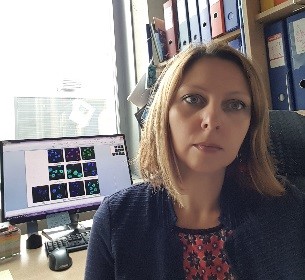RESEARCH OVERVIEW
Cancer is the disease caused by alterations in genes coding cell proliferation, apoptosis and differentiation of controlling proteins. At present, cancer therapy has shifted from the use of conventional cytotoxic drugs to molecular agents that target these specific regulatory molecules responsible for oncogenic transformation. However, therapeutic resistance, intrinsic or acquired, remains a major obstacle in the treatment of cancer. It is now increasingly recognized that not only genetic alterations but also non-genetic mechanisms are involved in drug resistance, as well as tumour progression. Cancer cells can acquire resistant phenotypes through epigenetic modifications, deregulation of signalling networks and other non-genetic mechanisms, dependent on both intracellular and extracellular factors associated with the tumour microenvironment.
Epigenetic Targeted Therapy Strategy for Leukaemia
Acute myeloid leukaemia (AML) is an aggressive, heterogeneous group of malignancies with different clinical behaviours and different responses to therapy. AML karyotypes are most commonly classified into three prognostic categories with differing median survivals as follows: 1) favourable risk, 7.6 years; 2) intermediate risk, 1.3 years; 3) poor risk, 0.5 years. The 5-year relative survival of adults diagnosed with AML was less than 10%. Given the poor prognosis, patients are encouraged to participate in clinical trials and/or pursue aggressive therapy. For many types of cancer, identifying the cancer early makes it easier to treat. There are a few screening tests on the market for an early detection of certain cancers in people without any symptoms. However, at this time, there are no special tests recommended to find acute myeloid leukaemia (AML) early. Identifying prognostic molecular markers and understanding their biology are the first steps toward developing novel diagnostic tools or/and therapies for patients with AML. Our team has over 30 years of experience in the cancer research field: human leukaemia differentiation and epithelial cancer growth inhibition/death molecular mechanisms.
Signalling in Cancer Treatment
Understanding cell death signalling networks concerning anticancer drug treatment is essential for identifying new drug targets and biomarkers in cancer therapy. Manipulating chemotherapeutic drug-induced signalling provides a promising strategy for targeted cancer treatment. The sequence of events and relations among signalling molecules, leading cancer cells to apoptosis or protecting normal cells during anticancer drug treatments are studied by the scientists of our team (A. Kalvelytė, A. Imbrasaitė, N. Krestnikova and A. Stulpinas). The induction or down-regulation of different and opposite cell signalling pathways, which may counteract one another, were found in lung cancer and muscle-derived stem cells as well as their differentiated progenies during chemotherapeutic treatments current tumour cell models and combination therapies directed to signalling molecules were rewieved (Kalvelyte et al., 2013, 2015; Abdelwahid et al., 2015, 2017; Stulpinas et al., 2012; 2016; Krestnikova et al., 2015), [4, 5].
SELECTED PUBLICATIONS
- Valiulienė, G., Vitkevičienė, A., Navakauskienė, R. The epigenetic treatment remodel genome-wide histone H4 hyper-acetylation patterns and affect signaling pathways in acute promyelocytic leukemia cells. Eur J Pharmacol. 2020 Dec 15, 889: 173641.
- Vitkeviciene, A., Skiauteryte, G., Zucenka, A., Stoskus, M., Gineikiene, E., Borutinskaite, V., Griskevicius, L., Navakauskiene, R. HDAC and HMT inhibitors in combination with conventional therapy: a Novel treatment option for acute promyelocytic leukemia. Journal of Oncology. 2019, 7: 1–11.
- Borutinskaitė, V., Virkšaitė, A., Gudelytė, G., Navakauskienė, R. Green tea polyphenol EGCG causes anti-cancerous epigenetic modulations in acute promyelocytic leukemia cells. Leukemia and Lymphoma. 2018, 59(2): 469–47.
- Kalvelytė, A. V., Imbrasaitė, A., Krestnikova, N., Stulpinas, A. Adult stem cells and anticancer therapy. Advances in Molecular Toxicology. 2017, 11: 123–202.
- Stulpinas A., Imbrasaitė, A., Krestnikova, N. and Kalvelytė, A. V. Chapter 7. Recent Approaches Encompassing the Phenotypic Cell Heterogeneity for Anticancer Drug Efficacy Evaluation. In: IntechOpen Tumor Progression and Metastasis.2020, 192-425. doi: 10.5772/intechopen.77832.


